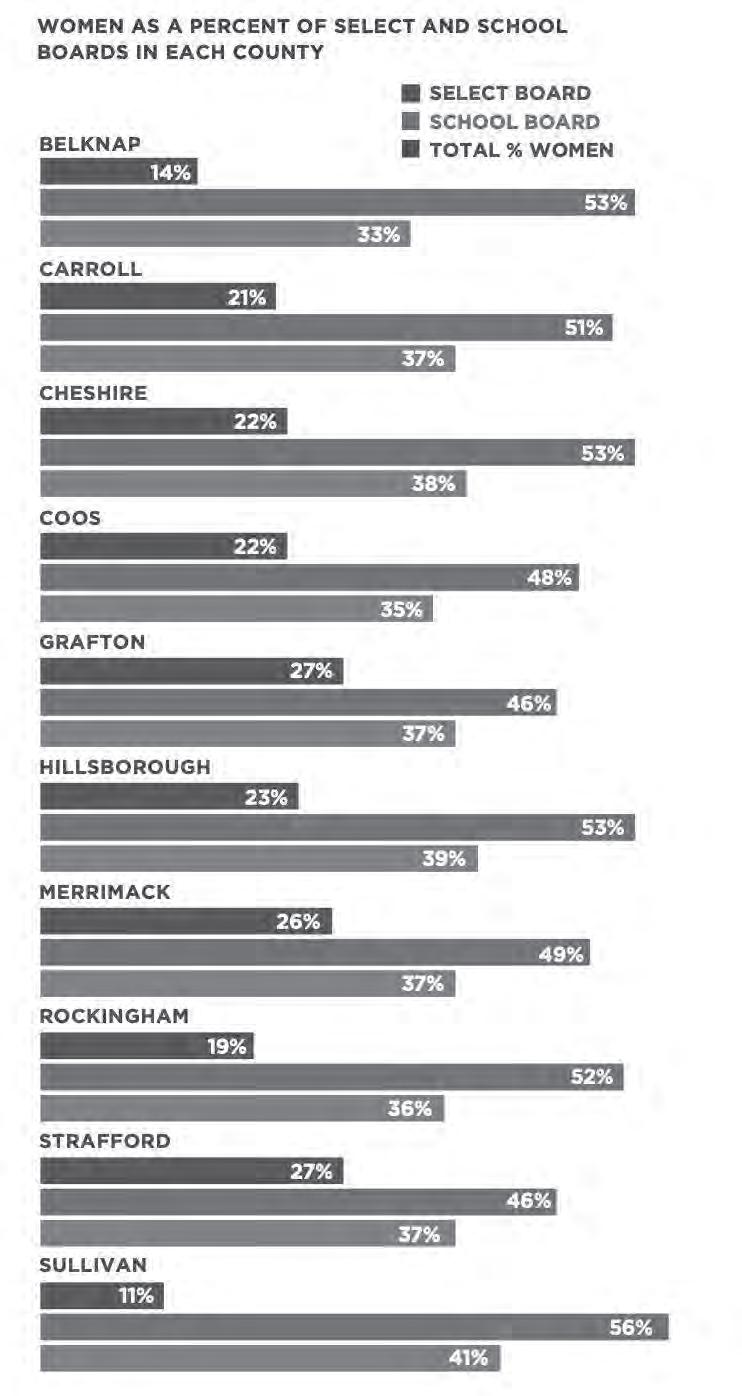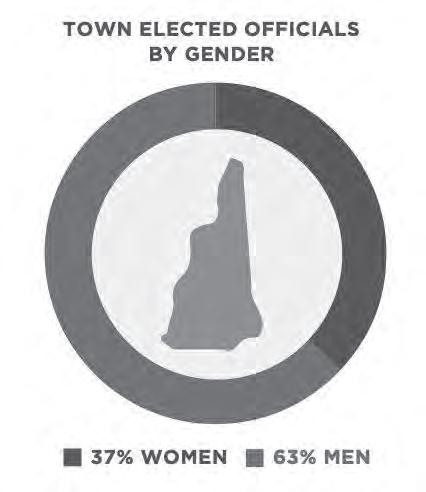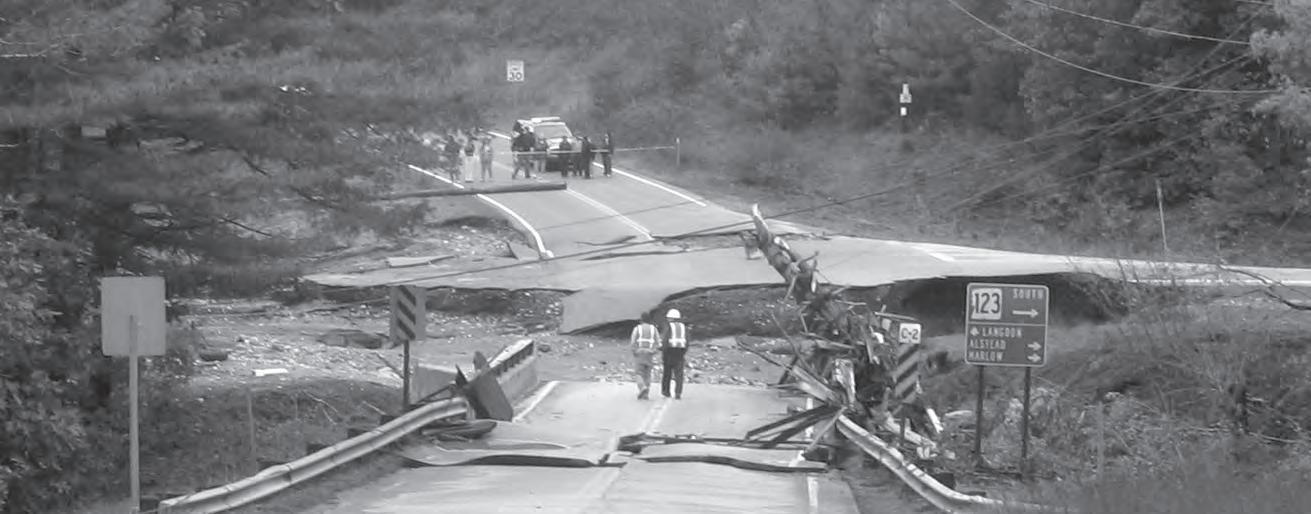
27 minute read
Upcoming Events
For more information or to register for an event, visit our online Calendar of Events at www.nhmunicipal.org. If you have any questions, please contact us at nhmaregistrations@nhmunicipal.org.
MAY
NHMA Hybrid Workshop: 2022 Hard Road to Travel
9:00 am – 12:30 pm Thursday, May 5 In-person/$65 – Zoom/$55.00
NHMA Virtual Workshop: 2022 Local Officials Workshop
9:00 am – 4:00 pm Tuesday, May 17 Free
NHMA Webinar: Investigations 101
12:00 noon – 1:00 pm Wednesday, May 18
NHMA Board of Director’s Meeting
9:00 am – 11:00 am Friday May 20
Memorial Day (NHMA Offices Closed)
Monday, May 30
JUNE
NHMA Hybrid Workshop: 2022 Code Enforcement
9:00 am – 12:00 pm Thursday, June 2 In-person/$65 – Zoom/$55.00
NHMA Virtual Workshop: 2022 Municipal Trustees Training
9:00 am – 3:00 pm Thursday, June 9 Cost: $70
NHMA Board of Director’s Meeting
9:00 am – 11:00 am Friday, June 17
NHMA Webinar: The Workings of a Planning Board
11:30 am – 1:00 pm Wednesday, June 29
Please visit NHMA’s website @ www.nhmunicipal.org frequently for the most up-to-date event and training information. Thank you.
Cordell A. Johnston
Attorney at Law Representing towns and cities
P.O. Box 252 Henniker, NH 03242 603-748-4019 cordell@cajohnston.com
Celebrating and Increasing Women Serving Our Towns and Cities

By Devan Quinn, Director of Policy, New Hampshire Women’s Foundation
Women Serving in NH Cities and Towns
The New Hampshire Women’s Foundation celebrates the women serving their town and cities as elected officials in so many roles amid so many challenges and opportunities. We celebrate the robust history of women in municipal office and we are grateful for the women stepping up to serve their communities now to build strong, vibrant communities.
However, there is a significant gender gap in elected representation for women at the local level. In 2021, only 35% of city councilors or alderpeople and 22% of town select board members were women. Across the political spectrum, we hear about the importance of gender and racial diversity on the Supreme Court, in the White House, and the Senate, but it’s just as important to have diversity in our town and city governments too.
Representation Matters
Studies have proved that when women serve, they are more likely to support policies that support women and girls in their community. Research shows women in elected office are more likely to seek bipartisanship and compromise than their male counterparts. From government to business to community, a diversity of perspectives leads to more robust discussion and includes more perspectives that lead to better outcomes. It is especially important to achieve gender representation for women on select boards and city councils, since they serve as the executive branch at the local level and have significant influence over the functions, budget and operations of the town.
By The Numbers
The NH Women’s Foundation released two reports on women’s representation in 2021 on Women in NH City Government and Women in NH Town Government (including school board). You can access them here: https:// nhwomensfoundation.org/our-impact/research/gendermatters/
In 2021, four cities had mayors who were women, Claremont, Franklin, Manchester, and Rochester, which is 23% of NH mayors. In 2022, two cities have women mayors, Franklin and Manchester, which represent 15% of NH mayors. In 2022, women represent 33% of City Councilors and Aldermen in all NH cities (not much difference from 35% women in 2021).

WOMEN AS A PERCENT OF SELECT AND SCHOOL BOARDS IN EACH COUNTY AS OF 2021

When we researched the town data in 2021, we found that women’s representation varies across the state with women serving on select boards at much lower rates than they serve on school boards. When the data was collected in 2021, 41% of towns had zero women on their select board. We look forward to comparing the data after all 2022 town meetings and elections. The NH Women’s Foundation would like to thank the NH Municipal Association for their support and collaboration to help us collect gender data on NHMA members so we can continue to offer data and track progress on women’s leadership in New Hampshire. Keep an eye out for the email survey coming in May/June!
Barriers to Women’s Leadership
Studies show that women often do not see themselves as potential candidates for office, even though, when they do run, they are just as likely as men to win. Women may assume they are underqualified even though they are as qualified as other candidates. Women are more likely to run for office when they are asked to run/ serve and when they are encouraged. If you’re a woman in office, does this resonate with you? What did it take to make the decision to run? For the men who want to support women in office, can you think of women in your community who would be excellent public servants? Will you ask them and encourage them to serve? How about a woman who is already serving - can you encourage her to run for a higher position? Women, particularly younger women, also point to career, family, and other responsibilities as barriers to serving. If you’re looking to support women serving their cities and towns, ask if they need child care! See if you can fill in for one of their many other roles to free up time to serve locally.
PROBLEM PROBLEM SOLVING SOLVING PROBLEMPROBLEM
It’s our strong point
www.underwoodengineers.comwww.underwoodengineers.com The Women Run! program
In response to this data and the voices of women across the state, the New Hampshire Women’s Foundation created the Women Run! program, a nonprofit, nonpartisan program to encourage and train women to run for office, regardless of their political affiliation. We offer a community of women who are serving or thinking about serving some day to share their hopes, challenges, and support with each other. You can sign up for our listserv here: https://nhwomensfoundation.org/womenrun/
Devan Quinn (she/her) is the Director of Policy at the New Hampshire Women’s Foundation, overseeing research, policy, and advocacy programs. Devan can be reached at devan@nhwomensfoundation.org or by phone at 603.226.3355.
PROBLEM PROBLEM PROBLEM SOLVING SOLVING PROBLEM SOLVING It’s our strong point It’s our strong point SOLVING It’s our strong point It’s our strong point
civil & environmental engineering civil & environmental engineering www.underwoodengineers.com civil & environmental engineering civil & environmental engineering www.underwoodengineers.com

By Andy Bohannon, Parks, Recreation and Facilities Director, City of Keene
It was 1982 in Keene, New Hampshire and another hot July day. I had ridden my bike through the park on my way to the neighborhood pool, where my friends and I often went to cool down and perfect our cannonballs. As I was waiting in line for the diving board, a large coach bus pulled into the parking lot, which I remember was unusually full for it being the middle of the day. The doors swung open and I was suddenly having my first experience seeing children of a different color as they got off the bus. I found it a bit weird and that night I asked my Mom what was happening. She explained to me that these children were part of the “fresh air” program. They travel from New York City to New Hampshire so that they can experience a week of natural green spaces in our more rural living environments.
These experiences impacted a lifelong dedication to Parks and Recreation, the opportunity to provide equal opportunities for Parks and Recreation programs, and diverse programming that included everyone. Community Parks and Recreation Departments nationwide have been delivering DEI (Diversity, Equity & Inclusion) since the start of our existence. It’s in our DNA to be the community resource for parents to send their children to safe and diverse after school programs, summer programs that are inclusive for participants and employees, youth sports opportunities that connect community volunteers wanting to enrich their communities, and parks offering places to gather without prejudice. Today, in 2022, how far we have come that these “fresh air” programs may or may not exist, or at least have been reimagined to serve our youth with a greater purpose of enrichment. The greater good demonstrates that more parks within communities are more prevalent and green spaces are closer to home, thus increasing access and opportunity.
The New Hampshire Recreation and Parks Association (NHRPA) and National Recreation and Parks Association (NRPA) are providing community resources to address DEI through training, tool kits, and online connections that create open conversations for Parks and Recreation professionals. This helps to improve professional development and provide an enriched quality of life experience for com-

Transportation | Water& Wastewater | Solid Waste | Structural
CMA
ENGINEERS
pursue excellence




PORTSMOUTH, NH | MANCHESTER, NH | PORTLAND, ME
www.cmaengineers.com
munities everywhere. On March 31st, members of the NHRPA gathered to learn more about the impact of racism and other forms of discrimination to increase our capacity and improve our relationships with everyone within our communities. Led by New Hampshire Listens and sponsored by the Endowment for Health, over 40 members convened to share experiences and engage in conversation to move us forward. It was an opportunity to make sure we are meeting our mission; are fully inclusive in our communities and developing our profession. For years, NRPA has focused members on three pillars of excellence: Health and Wellness, Equity, and Conservation, and with the unfortunate incidents that pushed the conversation forward in 2020 after the murder of George Floyd, Breonna Taylor and others, we knew we had to be engaged in the change for the better. Across the state and the country, parks have historically played a role in our country’s expressions of freedom and continue to do so via social demonstrations, creation of public art, and safe places to gather and feel free within a public space.
Parks and Recreation Departments are the fabric of our communities. After an era that caused many to fiscally squeeze department budgets, as some communities couldn’t see the value they provided, the communities who embraced Parks and Recreation often thrived during the COVID pandemic. This is because citizens flocked to the well maintained and safe outdoor spaces and programs that were being offered to children for remote learning. It was a time for innovation and

3

Your Partner — Always

We’re here for you.



In addition to offering comprehensive coverage and risk management training, Primex3 consultants are always available to help you navigate challenges – including Human Resource and Legal matters, Cyber Security concerns, and much more. We know your needs are evolving, and so are we.
Not sure? Give us a call.
800.698.2364
Bow Brook Place 46 Donovan Street Concord, NH 03301-2624 Trust. Excellence. Service.
Offering Property & Liability, Workers’ Compensation, and Unemployment Compensation Programs to NH municipalities, schools, counties and special districts.
800-698-2364 603-225-2841 www.nhprimex.org
PARKS AND REC from page 13
providing access to all, the core of our mission.
In Parks and Recreation we embrace opportunities to provide diverse opportunities for all, we pride ourselves on including ALL community members. As we roll into summer and program staff provide our youth opportunities to explore who they are as individuals, our program staff are also learning who they are, and together we can all become more included and more diverse. Parks and Recreation builds community, strong recreational programs increase awareness and create a more desirable and welcoming opportunity for families. When families move into your community, increasing your diversity, and feel included and welcomed, equity can begin to take shape. Its hard work for all of us, and nobody can be excluded in the work it takes to create a positive and welcoming environment. The perfect place to start is where it’s already been happening for decades, with Parks and Recreation.
If your community is not a member of the New Hampshire Parks and Recreation Association, please visit www. nhrpa.com to see the benefits of joining. NHRPA is an association that advocates for the development and administration of recreation and park services, without discrimination, by means of educational seminars, meetings, conferences, and work to improve recreation and park activities in New Hampshire.
Andy Bohannon is the Parks, Recreation and Facilities Director for the City of Keene, New Hampshire. Andy can be reached by phone at 603.357.9829 or via email at abohannon@keenenh.gov.

certified public accountants
experience counts
We know New Hampshire governments. Your needs come first at Vachon Clukay & Company, PC, so we’ve structured ourselves to fulfill all of your service needs. We provide the following services:
Auditing Accounting Support and Training Advising Personalized “Team” Service Expertise in How Your Organization Operates Computerized Forms Operational Management Studies
We want to be part of your team. We want to be part of your team. For personal attention contact: For personal attention contact: Robert L. Vachon, CPA Jarad Vartanian, CPA
608 Chestnut St. • Manchester, NH 03104 Phone: (603) 622-7070 Fax: (603) 622-1452 www.vachonclukay.com


By Talesha L. Saint-Marc, Esq., Co-Chair Labor & Employment Practice Group
The 2017 #MeToo movement and the national conversation the movement ignited brought heightened awareness to sexual abuse and sexual harassment in the workplace and beyond. Consequently, employees felt empowered to report allegations of sexual misconduct in the workplace, and employers were forced to review and revise their policies and respond to increased reports of misconduct.
Likewise, escalation of racial tensions in the summer of 2020 and the strength of the #BlackLivesMatter movement sparked a national conversation about race and equity that fueled a drive for change in the workplace. As with the #MeToo movement, the #BlackLivesMatter movement caused employers to create or reevaluate their internal policies and procedures, while other employers focused on raising employee awareness of their established policies. Further, increased awareness of racial injustice and unequal treatment has led to increased numbers of employees raising concern about workplace inequities. As with any workplace complaint, municipalities must take these concerns seriously and investigate them properly.
Although investigating bias complaints can be challenging, the following tips can help municipalities ensure they are conducting effective investigations and maintaining a workplace free of discrimination and harassment.
Establish Trust with Employees
Without trust, employees are less likely bring their concerns forward. The foundation to trust with employees starts with creating clear anti-harassment and anti-discrimination policies. Your policies should be in writing and accessible to employees, and it is essential that you regularly train employees at all levels regarding the policies. The next crucial step in building trust with employees is to enforce your policies consistently and fairly. Employees gain confidence in the system when they observe their employer follow the established procedures in an equitable and consistent manner.
Select an Appropriate Investigator
Investigator selection is crucial in all investigations, but perhaps more so when investigating a bias incident. The right investigator must possess the skills, knowledge, and experience to conduct the investigation, but also must be free of bias and conflicts of interest. When investigating racial and other bias complaints, municipalities should also consider whether the investigator’s demographics (i.e. race, age, etc.) will impact the investigation. For instance, if an Asian employee makes a race discrimination complaint, the employee may feel more comfortable discussing the complaint with an investigator that has the same racial background, or at the very least, a non-Caucasian investigator. Selecting an appropriate investigator furthers trust between the investigator and parties or witnesses and lends credibility to the investigation.
Understand the Impact of Microaggressions in the Workplace
The #BlackLivesMatter movement not only increased awareness of racial injustice in the workplace generally, but it highlighted a specific form of bias – microaggressions. According to Merriam-Webster Dictionary, micro-

aggression is defined as “a comment or action that subtly and often unconsciously or unintentionally expresses a prejudiced attitude toward a member of a marginalized group (such as a racial minority).” Microaggressions are usually harder to investigate because the employee’s complaint does not generally involve a blatant act of bias, but rather, smaller acts or expressions of bias. Nevertheless, microaggressions can rise to the level of unlawful discrimination and/or harassment, and more importantly, they can impact employee morale. Accordingly, municipalities should not dismiss microaggressions as insignificant slights and fail to investigate them. Rather, microaggressions should be investigated in the same thorough manner as other complaints.
Don’t Ignore Anonymous Complaints
Employees are not always comfortable bringing forward complaints, and yet, anonymous complaints should never be ignored. Municipalities should take all complaints seriously and conduct some level of investigation to ascertain the nature and scope of the allegations. If the allegations are not specific enough to make findings, but indicate a widespread problem, municipalities should consider whether a DEI assessment or climate study is appropriate. It is important to consult legal counsel before conducting such an assessment or study.
Ultimately, investigations help municipalities identify and resolve internal problems and reduce liability to the municipality. Thus, it is important in all investigations, but especially in complex racial and other bias investigations, that municipalities select a highly qualified investigator and address all complaints in a fair and consistent manner.
Talesha Saint-Marc is the Co-Chair of Bernstein Shur’s Labor & Employment Practice Group and a shareholder in the firm’s Investigations & Resolutions and Litigation & Dispute Resolution Practice Groups. She provides thoughtful and practical advice and counsel to employers regarding all aspects of employment law, including the FLSA, FMLA and ADA compliance, and Title VII and state human rights claims. She may be reached at 603.665.8814 or via email at tsaintmarc@bernsteinshur.com.
The Bond Bank’s Next Bond Issue will be on June 7, 2022
January 2022 Bond Sale Results - True Interest Cost for:
5 year loans 1.26% 10 year loans 1.41% 20 year loans 2.09% 25 year loans 2.34% 30 year loans 2.36%
Are you planning a capital project for 2022?
We can assist you with your planning by providing various scenarios based on level debt or level principal payments for different terms. Contact us now for your estimated debt schedules.
To schedule a meeting, obtain debt service schedules, or for details about our schedule, fees, Bond Anticipation Note programs, and current interest rates, please contact Tammy J. St. Gelais, Executive Director, at tstgelais@nhmbb.com. Visit our website at www.nhmbb.org.

Basic Loan Requirements:
• Bond issue approved by governmental entity
• Completed application approved by Bond
Bank Board
• Audit by CPA firm
• Local bond counsel opinion
Lebanon Middle School, Lebanon, NH

By Donna Kuethe, CPRP
Parks and Recreation agencies play a vital role in the physical, economic, social, and emotional health of New Hampshire communities and provide essential community services. Park and Recreation opportunities create the positive quality of life that attracts people to our communities. Following a disaster, the opening or re-opening of recreation facilities as well as the return of recreation services such as youth sports, special events and social programs for seniors, play an important role in the collective mental health and full recovery of a community - often signifying that crucial “return to normalcy.”
Do Recreation practitioners have a role in emergency management and disaster preparation, response and recovery? The answer is “Yes”.
Is your Department Prepared? The first and most important role for Recreation agencies, in terms of Emergency and Disaster Preparedness, is to ensure the Department is prepared.
According to the 2019 GP RED’s REDline Survey, the following conclusions were published: Park and Recreation agencies play a significant role in community disaster and response; the majority who responded had been affected by a disaster, but the majority had not received training or been prepped for disaster or emergency response in the past three years.
Asset Inventory: Best practices recommend Recreation Departments create and maintain up-to-date, detailed, accurate inventories for all properties, facilities, amenities, and equipment. A comprehensive record of what the community had prior to the disaster aids in determining loss, damages, completing required insurance and FEMA paperwork, and reduces the time and work required to get the community restored post disaster. It’s important in obtaining grants that may be available to help restore/replace lost facilities and equipment. Records related to the purchase or lease of
“I know we should be prepared, I just don’t know what that means” – Park and Recreation Practitioner’s Response in the 2019 GP RED’s REDline Survey exploring the role of parks and recreation in disaster response and recovery.

property, proof of ownership or right to occupy should be included and are important in obtaining grants.
Long range Planning and Inventory:
As part of the inventory process, take a critical assessment of each facility. Is it adequate to meet the long-range needs of the community? If you were to build the facility again what improvements would be made? Perhaps, an athletic field has drainage issues, an indoor facility has inadequate heating systems, or a gym not conducive to current programs? If those were damaged or destroyed, it wouldn’t make sense to re-create space that isn’t meeting the needs of the community. These plans should be included in Strategic, Master and Capital Improvement Plans, well documented and discussed as plans for the Department. Any additional equipment and supplies that may be needed due to an improvement in facilities or additional greenspace created as mitigation measures should also be included.
Emergency Action Plan: Does the department have an Emergency Action Plan in place that includes procedures for emergencies such as fire, lost child, natural and human made disasters? What is the evacuation plan? Where do people meet? Who is designated to ensure everyone has safely exited facilities? Is the plan reviewed and updated regularly and practiced with participants in the facilities? Are contracted instructors, volunteers, seasonal and part time staff included in the plan and in practices? Does it include a communication plan? How are facilities accessed? Where are keys, lock and alarm codes? Who has access? Are there plans for who does what and when? All necessary information must be stored where staff can access it.
Recreation agencies that use school facilities for programs must ensure that staff, instructors and volunteers who use those facilities be familiar with their procedures.
According to GP RED’s Survey referenced earlier, of those responding, 57% had a Park and Recreation Emergency Plan in place; 21% did not and 27% did not know if they did or not. In that same survey, the question was asked if they had received training for an emergency or disaster with the response revealing that only 36% had while 64% had not. If the Recreation Department is not prepared for disaster, the community is not fully prepared.
Who is on your “TEAM” and Whose “TEAM” should you be on?
The Recreation Department should be represented on the municipality’s Emergency Management Team. In the REDline survey referred to earlier, in response to the inquiry as to whether or not they were on their municipality’s Emergency Management Team, 46% indicated they were, 21% answering no and 25% did not know.
Aren’t Parks and Rec the fun people? What can they bring to the Emergency Management and Disaster Preparedness table? Much. Recreation personnel have skills and experiences that are valuable assets to their communities in times of emergencies and disasters. They possess multiple levels of training in risk management, emergency preparedness, special event planning, facility operations, human resources, child development, first aid and CPR. Many have advanced training like EMT, Wilderness First Responder and many either are, or employ, lifeguards with professional rescuer experience. Recreation practitioners manage facilities, multiple staff members and volunteers. Park and Recreation facilities are sometimes used as shelters, evacuation meeting points, staging areas etc. Many also manage valuable resources that may be needed like vehicles and equipment, such as busses or vans called to action in evacuations, as well as staff trained and certified to drive them.
Equally important, Recreation professionals are well known to community members – seniors, children, families and adults. They may have already established relationships with much of the population. This can be helpful for assistance in house checks, evacuations, sheltering, etc.
In several New Hampshire communities, facilities such as community or recreation centers become the emergency shelters during an event.
In terms of who should be on “Your Team”? In essence, the majority, if not all, of the department’s staff – full and part time, seasonal and, possibly, volunteers should have specific, defined, and practiced roles and duties in emergency plans. Likewise, emergency and disaster response must be part of all trainings such as summer staff, youth sport coaches, lifeguards etc. Although not everyone will need the same training, just about everyone in the department needs training in emergency

THE ROLE OF PARKS from page 19
preparedness and procedures. Consider NIMS – National Incident Management Systems training (FEMA) for those in Recreation leadership.
Special Events as Training Tools – Recreation personnel are experienced in planning, coordinating and managing special events, and, therefore, possess skills and experiences that translate to emergency and/or disaster events. Recreation special events can provide opportunities to practice elements that apply to emergency response and can be used as a training tool. Special events often deal with large groups of people in a variety of settings and may include, providing food, overnight accommodations (think - Family Camp out), registration, transportation, crowd control, traffic control (think - Road Races) and collaboration with multiple municipal departments such as police, EMS and Public Works, developing communication plans as well as collaborating with neighboring communities. Building the relationships, familiarity with procedures and personnel prior to an emergency/ disaster is key.
Emergency Shelters – As mentioned earlier, recreation facilities may be used as emergency shelters. These may be run by the municipality or an agency like the American Red Cross. Recreation programs may be interrupted although some may continue while the shelter is in place. Ideally, recreation activities should be provided to individuals in shelter situations – especially for those sheltered for extended periods of time. Recreation providers have the supplies, equipment, knowledge, experience and are background checked to provided safe, fun activities to combat boredom and provide social experiences. Including Recreation personnel and finding space, supplies and time for supervised recreation for all should be included in local shelter plans and accommodations.
Reaching Vulnerable Populations:
Recreation personnel can be instrumental in reaching vulnerable populations such as the elderly, children and those with special needs. Recreation staff may have relationships with these populations that other agencies may not – participants in senior programs, children who may not be enrolled in public schools, individuals with disabilities - all may use Recreation facilities or programs. Those relationships are helpful in the response phase of a disaster – such as evacuations and house checks.
Mutual Aid for Parks and Recreation
in Disaster - Mutual Aid agreements between municipal jurisdictions are key to response and recovery from disasters. Police, Fire, EMT’s, Public Works, as well as Park Maintenance crews often respond to jurisdictions covered by Mutual Aid Agreements within states or inter-state. Formal Mutual Aid agreements for recreation facilities are often established through Public Works or other entities. However, assistance provided for recreation services has largely been handled less formally, if at all. The suggestion here is that recreation services be included in Mutual Aid agreements.
As referenced above, the return to normalcy signified by the re-opening of facilities and return of recreation programs is key to the healing and recovery process. Including recreation services in mutual aid allows recreation professionals unaffected by the event to assist in the continuation or resumption of programs.
Rebuilding Resilient Communities through Parks and Recreation:
Parks, Recreation and Greenspace Planning play an important role in rebuilding communities for long term resiliency, especially in terms of recovery from hurricanes, floods and wildfires. While wildfires and hurricanes are somewhat rare but not unheard of in NH, there have been significant flooding events – coastal and inland. According to the National Recreation and Park Association in the NRPA magazine article entitled, Parks as a Solution to Climate Change - “Strategically placed and managed parks and natural lands buffer cities from rising seas, coastal storms, inland flooding and wildfires. In addition, FEMA’s Building Resilient Infrastructure and Communities (BRIC) Program incentivizes mitigation projects that include nature-based solutions. An example of this is the Lumberton, NC project that created an 8 mile greenway system in the 100 year flood plain, prone to hurricane flood damage.
Conclusion: Ensuring Parks and Recreation agencies are prepared for, respond to, return to providing recreation services and opening of recreation facilities as soon as possible following a disaster, is crucial to creating community preparedness, response, recovery and resiliency. Recreation practitioner’s commitment is to enhance the quality of life in the communities served. These efforts are most needed when the “quality of life” is at its lowest.
Donna Kuethe is the Executive Director of GP RED – a national non-profit that provides Research, Education and Development for Parks, Recreation, Health, Land Management and Allied Fields. She is the Initiator of the Operation Recreation Response Initiative. Donna retired in 2020 after serving 41 years as the Recreation Director for the Town of Moultonborough.
Legislative Policy Process Update
Thank You to our Participating Members
As many municipal officials already know, our legislative work is a full-time, year-round job. It is an ongoing process and staff members have already been working on laying the foundation for the next legislative biennium. The success of NHMA’s legislative efforts, in large part, depends on you. You work at the level of government that is closest to the citizen and you are uniquely situated to help legislators understand how pending legislation affects your city or town.
Thank you to the following member volunteers that are serving on our three legislative policy committees. These committees will review legislative policy proposals submitted by local officials and NHMA affiliate groups and make recommendations on those policies, which will go to the NHMA Legislative Policy Conference in September.
Finance and Revenue
Cheryl Lindner, Treasury Management Officer, Nashua (Chair) Jim Michaud, Chief Assessor, Hudson (Vice Chair) Karen Anderson, Town Administrator, Hampton Falls Tammy Bakie, Town Clerk/Tax Collector, Kingston Scott Bugbee, Selectman, Lee Michael Capone, Town Administrator, Holderness Terri-Lee Jansky, Assessing Assistant, Sanbornton Kim Kleiner, Administrative Services Director, Nashua Tom McCue, Planning Board Chair, Berlin Chris Sterndale, Town Administrator, Nottingham Ken Traum, Selectman, Hopkinton Bill Duschatko, Councilor, Bedford John Robertson, Selectman, Antrim Stephen D’Angelo, Selectman, Chester
General Administration and Governance
Dave Caron, Town Administrator, Derry (Chair) Pat Long, Alderman, Manchester (Vice Chair) Angela Brennan, Selectwoman, Bow Laura Buono, Town Administrator, Hillsborough Joe Devine, Assistant Town Manager, Salem Jaseya Ewing, Town Clerk, Plymouth Steve Fournier, Town Manager, Newmarket April Hibberd, Selectman, Bethlehem Kathleen Hoelzel, Selectman, Raymond Dannen Mannschreck, Selectman, Barrington Donna Mombourquette, Selectman, New Boston David Moore, Town Administrator, Stratham Matt Mooshian, Councilor-At-Large, Claremont Danielle Pray, Selectman, Amherst Ken Robichaud, Town Administrator, Northfield Dino Scala, Town Administrator, Wakefield John Shannon, Town Administrator, Milford Judy Strakalaitis, Supervisor of the Checklist, Derry
Infrastructure, Development and Land Use
Shaun Mulholland, City Manager, Lebanon (Chair) Dennis Shanahan, City Councilor, Dover (Vice Chair) Candace Bouchard, Councilor, Concord Jessica Call, Town Planner, Alton Lynn Christensen, Moderator, Merrimack Ben Frost, Planning Board Chair, Warner Laura Gandia, Associate Planner, Londonderry Derik Goodine, Town Administrator, Allenstown Mike Hodder, Planning Board VC, Wolfeboro Robin Irving, Land Use Coordinator, Lancaster Brianna O’Brien, Conservation Coordinator,
Hampton Scott Osgood, Selectman, Henniker Scott Scott, Tax Assessor, Portsmouth Michael Sununu, Selectman, Newfields Lindsey Williams, Councilor At Large, Dover Ivy Vann, Planning Board, Peterborough Jeanie Forrester, Selectman, Meredith








